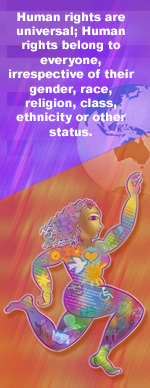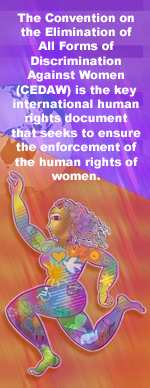Woman of the World - What are Human Rights?
Woman of the World -
Know Your International Human Rights
- Preface
- What are human rights?
- What is the United Nations?
- The UN: Protecting the rights of woman
- What is CEDAW
- Australia's signing of CEDAW
- A guide to the rights in CEDAW
- CEDAW and the Sex Discrimination Act
- The Optional Protocol to CEDAW
- What about Beijing?
- What can you do: The public sphere
- What can you do: Private actions
 Human rights define the value and worth of each person and their relationship to society. They identify standards regarding the quality of life that each of us can expect to enjoy.
Human rights define the value and worth of each person and their relationship to society. They identify standards regarding the quality of life that each of us can expect to enjoy.
Human rights have the following qualities: -
- Human rights are inherent:
Human rights do not have to be given to us by a government to exist. They are our birthright and belong to us simply because we exist as human beings.
- Human rights are inalienable:
Human rights cannot be given away or taken away, they stay with us for as long as we live.
- Human rights are universal:
Human rights belong to everyone, irrespective of their sex, race, colour, religion, national or social origin or other status.
Many human rights have been recorded internationally in human rights documents by the United Nations. The Universal Declaration of Human Rights, adopted in 1948, forms the basis of these documents.
"...recognition of the inherent dignity and of the equal and inalienable rights of all members of the human family is the foundation of freedom, justice and peace in the world"
"...disregard and contempt for human rights have resulted in barbarous acts which have outraged the conscience of mankind, and the advent of a world in which human beings shall enjoy freedom of speech and belief and freedom from fear and want has been proclaimed as the highest aspiration of the common people"
Preamble, The Universal Declaration of Human Rights
 Human rights enforcement:
Human rights enforcement:
Even though human rights exist as a birthright, to be effective they need to be enforced. Human rights enforcement happens in many ways, through the United Nations, through our governments, the police, our employers, our families, our friends and, most importantly, through us as individuals. Our own awareness and support for human rights is the most important way to enforce them.
Women's rights as human rights:
This package focuses on women's rights as human rights. As human rights are universal, women have the same rights as men.
United Nations human rights documents guarantee equality and non-discrimination on the basis of sex. However, they do not create specific rights for women's lives. Instead, they offer women the opportunity to exercise, on the same basis as men, universally recognised human rights.
Due to some social structures, traditions, stereotypical assumptions and attitudes about women and their role in society, women do not always have the same opportunity and ability to access and enforce their rights, on the same basis as men.
The Convention on the Elimination of All Forms of Discrimination Against Women (CEDAW) is the key international human rights document that seeks to ensure the enforcement of the human rights of women. It focuses on the reality of women's lives and the experiences that they have, as women.

